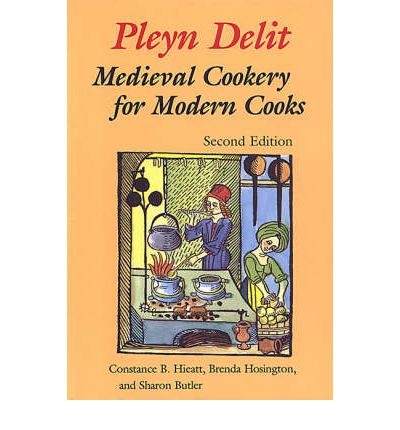
Pleyn Delit: medieval cookery for modern cooks (second edition) Constance B. Hieat, Brenda hosington and Sharon Butler.
[dropcap style=”no-background”] W [/dropcap]hen I decided to start reviewing books in order to help people decide on the right book for them, my immediate first choice was Pleyn Delit. It is the book I recommend the most when asked about what sources I use myself and at A5 and 173 pages including the bibliography, is slim enough to carry around without being overly cumbersome.
Pros: recipes are divided up into categories (pastries, stews/pottages, desserts etc) and all recipes are simple enough for a beginning cook. The original (translated) recipe is at the start of the redaction, allowing more experienced cooks to tweak the recipe based on their personal tastes and desires,while less confident cooks can follow the recipe, assured that the end result will be tasty. Any ingredient which is not easily found in the local supermarket has an appropriate substitution (although as the book was written 20 years ago, some of the ingredient such as almond milk as now easily found) and so the shop can be done fully in a supermarket run if so desired.
Cons: the recipes are all fairly straightforward and the recipes, while containing the same ingredients, I believe have been redacted to appeal to modern tastes more often than not. This book is not for very experienced cooks or those looking to challenge their palette.
The first reason that I recommend Pleyn Delit over other sources is the receipts are very straightforward. Each recipe has the original recipe translated as the first item, along with where the recipe is originally from, then a redaction of that recipe. Every recipe that I have tried from Pleyn Delit turns out well and when I give the book to other less experienced medieval cooks, everyone has been able to turn out an excellent end result as well. while measurements are given in ounces for a North American audience, translations of the measurements can be found in the introduction and the simple
Many favourites can be found in Pleyn Delit, including Tart on Ember Day, Fennel in soppes, frumenty, pepper sauce and chicken in cumin sauce.
Almost all receipts are taken from 14-15th century manuscripts, with the majority being English or French.
In short, I highly recommend this book for everyone who wants to do more period cooking but doesn’t want to work out a redaction themselves, who lacks confidence in their skills?or who just wants to eat some delicious and different foods.
On my re-enactment blog, I make the castle subtlety from this book and it turned out fairly well.